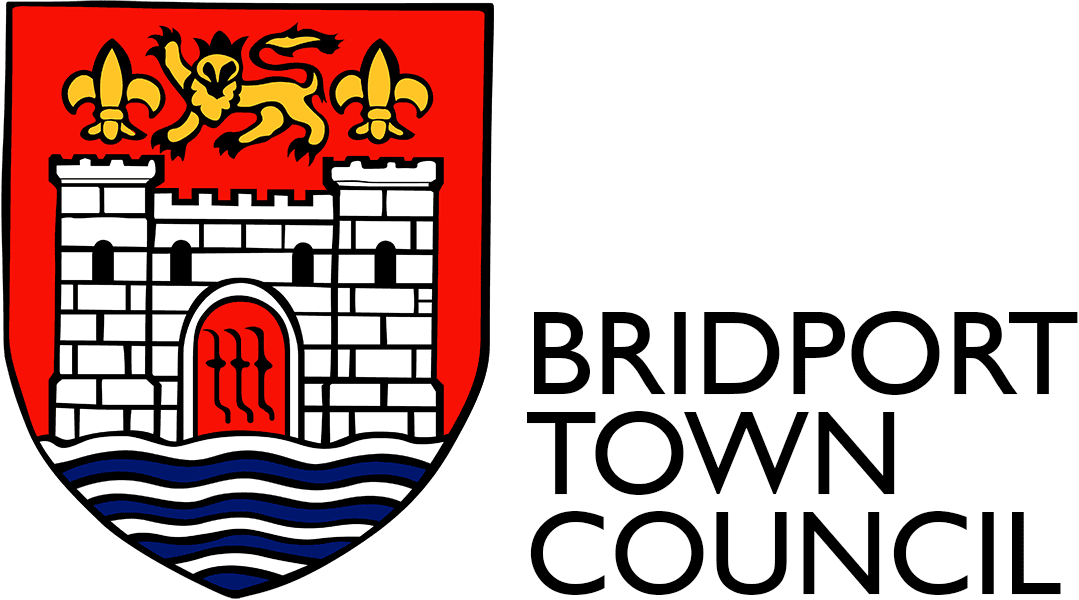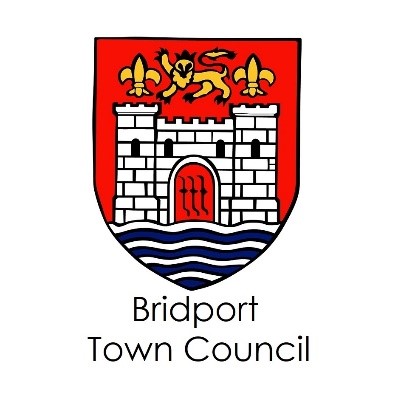
Dealing with Bridport’s Waste
Over the past few months I have become increasingly aware of the waste my household generates and what happens to it. Hence my involvement in the Plastic free Bridport campaign and my recent Blog looking at how we can have a greener Christmas next year.
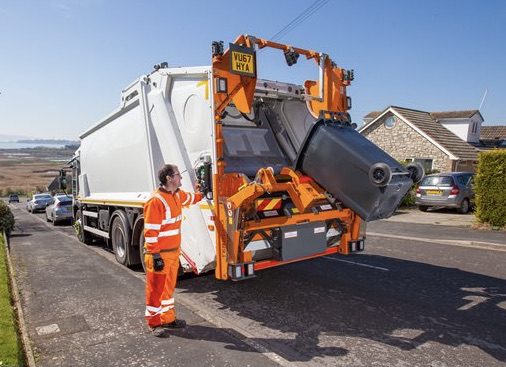
Bridport is fortunate in having on its doorstep a state of the art recycling centre at Broomhills and an excellent kerbside waste collection service delivered by Dorset Council. Like you, I diligently separate my waste into the various bins and usually remember to put the right ones out on the right day. Once done I can relax knowing that my waste is being dealt with.
But what really happens to it?
I spoke to Ian Manley Contracts Manager at Dorset Council to find out more. He told me:
“All the recycling collected in the Dorset Council area is firstly bulked up within Dorset (in your case the Bridport facility), before being transported to North Wales to be sorted. The reason for sending it to North Wales is based on the scale and capability of the sorting facility. Operated by UPM, the materials recycling facility at Shotton is one of the largest and most modern facilities available within the UK. It was chosen because after the recycling is sorted, UPM seeks and uses reprocessors for the materials mostly in the UK, the bulk of these reprocessors are located within the North West (UK). “
“Separated recycling is however sent to Europe and beyond on occasions. It is important to state that the recycling industry is a truly a global commodity market. The UK at this point in time does not have sufficient reprocessing capacity to recycle all of the materials it creates. Therefore reprocessors outside of the UK are used. These are routinely vetted by our contractor UPM to ensure materials are handled, stored and reprocessed via methods comparable to those required in the UK by law.”
He also let me have a copy of a video he has produced to share with you.
That film certainly gives us an insight into the sheer scale of the waste management system we have supporting us and for which we are all extremely grateful. In the film Ian mentioned a few figures:
- Waste disposal accounts for ~£15 million of Dorset Council spending annually. The figures below give an insight into costs of dealing with the different types of waste we generate.
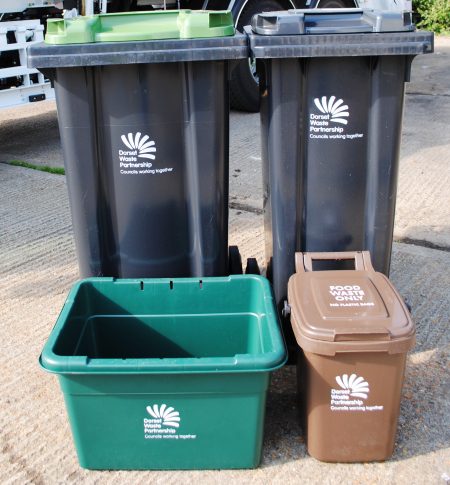
Glass waste makes the council £1-5 per ton
Food waste costs the Council £25-35 per ton
Garden waste costs the Council £20-35 per ton
Green bin (recycling) waste costs the Council £35-40 per ton
Black bin waste costs the Council £110-120 per ton
From the figures above it is clear to see where the most significant cost occurs – it is our black bin waste.
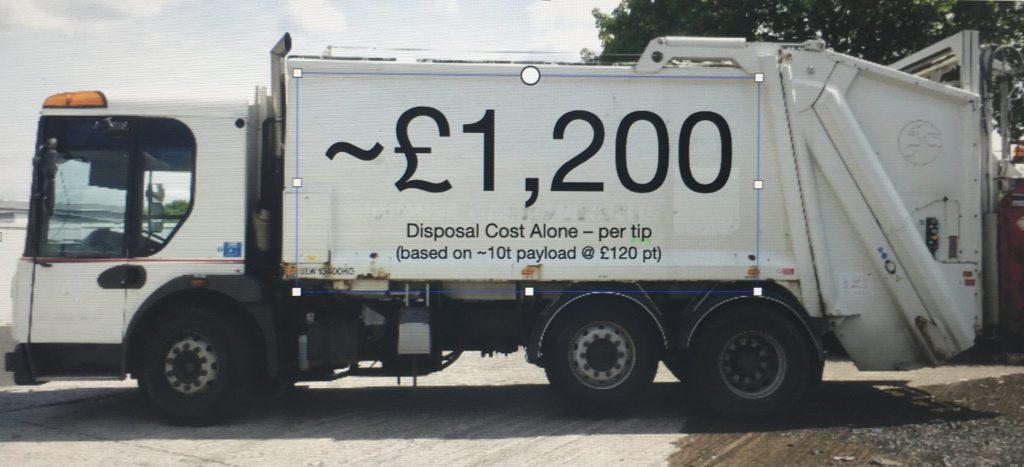
The average black bag bin lorry holds up to 10 tons and the council delivers up to 200 tons per week to the Broomhills site. That’s a lot of waste! Disposal cost alone per tip based on a 10 ton payload @ £120 per tip amounts to a staggering £1,200 per tip. Yes, that’s a whopping £1,200 it costs to dispose of the contents of every single black bag bin lorry load of our waste.
But that is only the start of the story. As Ian told me the waste is then transported to Shotton in North Wales where it is sorted. Some of the sorted waste is reprocessed, some goes too biodigesters, but a significant amount is incinerated as fuel to generate power and heat.

During a debate in the House of Commons on January 13th 2021 about waste incineration, Environment Minister Rebecca Pow defended the role of incineration to deal with residual waste in the face of severe criticism over the technology from MPs.
Pow responded to claims that it lowered recycling rates and produced unacceptable levels of greenhouse gases and pollution by saying; “Energy from Waste (EfW) produced lower carbon emissions than landfill,” and said Public Health England had concluded that “modern, well run and regulated municipal waste incinerators are not a significant risk to public health”.
She added: “Despite our high ambitions, there will always be waste that cannot be recycled or reused, potentially because it is contaminated or because there is no end market. There are choices to make about how we manage that unavoidable residual waste, and in making them we need to consider the environmental impact. The legacy of our reliance on landfill is responsible for about 75% of carbon emissions from the waste sector, so it is not a simple matter of switching back to landfilling non-recyclable waste.”
During the debate Conservative MP Elliot Colburn, who is campaigning against construction of Viridor’s Beddington energy-from-waste (EfW) plant in south London said: “As landfill sites have begun to close and be phased out, incineration has picked up much of that demand, with incineration rates rising nearly four times, from 12% to 44%, during the past decade. However, recycling rates have barely moved at all in the past decade, from 37% to 43% – just a 6 percentage point increase. That is not coincidental or unrelated.”
Whether we return to using landfill or continue to use incineration to dispose of our residual waste, sadly, it will always be with us. Even if the UK achieves its target of 65% recycling by 2035, a proportion of residual waste will remain and will require an energy-recovery treatment solution if the Government also wishes to hit its target of sending less than 10% of residual waste to landfill over the same time period.
As a community we all need to be doing considerably more to try to reduce the amount of waste we put into our black bins.
PROBLEM – Much of the weekly waste we generate comes from the food we eat. The good news is that our food waste bin deals with cooked leftovers and we can compost vegetable peelings etc. The bad news is the packaging it all comes in. Card and paper can be recycled but all that plastic is where the problem lies.
SOLUTION – Buy fruit and vegetables that are not wrapped in plastic. Buy meat from a local butcher who cuts and dresses it before your eyes and wraps it in paper ready to pop into the bag you have brought with you. Buy bread and pastries from a baker who uses paper rather than plastic bags. Buy dry goods such as pulses, pasta and flour from stores that operate a bring your owe container refill system.
PROBLEM – internet shopping has generated a huge rise in the amount of packaging we generate, a significant proportion of which cannot be recycled and ends up in black sacks.
SOLUTION – shop local and take the product home in its original packaging instead of all that additional packaging used to keep it safe in transit to you via courier. You will be surprised how many local shops are happy to order items they do not stock.
PROBLEM — sandwiches, pies, cakes crisps and similar food products bought to provide us with food when at work or on the move. All of the packaging used to supply these products ends up in a black sack somewhere or worse as litter along our pavements and verges.
SOLUTION – spend 10 minutes making your own packed lunch. It will cost less and be better for you.
None of the above is rocket science and once you put your mind to it I am sure you will find other ways to reduce the volume of residual waste you put into your black bin.
The less you generate, the less it costs to deal with, and above all, the better for our environment.
Finally a message from Dorset Council about what to do with your waste if you or someone in your household is showing symptoms or has COVID-19
If you or someone in your household has symptoms that may be caused by COVID-19 or have received a positive COVID-19 test result, please note the following guidance: –
Cleaning cloths and personal waste such as used tissues and disposable face coverings should be stored in disposable rubbish bags. These bags should be placed into another bag, tied securely and put aside for at least 72 hours before being put in your usual external household waste bin or authorised blue sack. Other kinds of household waste can be disposed of as normal.
To dispose of any face coverings or PPE you or members of your household use when self- isolating, you should:
- double bag them and store them for 72 hours before putting them in a ‘black bag’ waste bin
- never put them in a recycling bin.
You may also wish to clean the handles on your bins before and after they have been emptied.
The Recycle for Dorset kerbside scheme has been designed to minimise contact between our employees and the waste we collect but following the above guidance will further protect everyone involved during the collection process.
